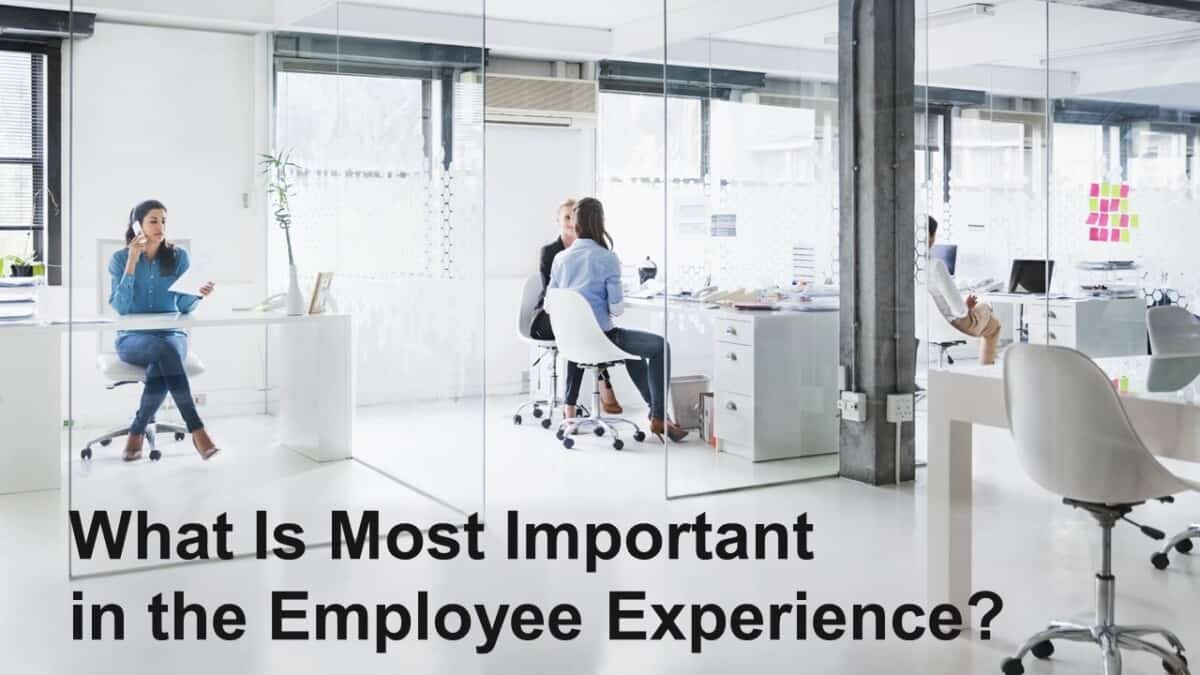Share:

Employee experience encompasses everything from an employee’s first interaction with the company, including the recruitment process, to the last, including any interactions they have with their employers after leaving the company. It is influenced by everything from the physical work environment to the company’s culture.
We are still learning about the extent to which employee experience can impact all aspects of a business—profitability, engagement, market positioning, retention, and customer experience, to name a few—but the evidence is clear that long-term success is contingent upon the quality of the employee experience.
So, the question is, how do we lead in ways that will ensure our team members have the kind of exceptional experiences that we work so hard to give to our customers to make future success a reality?
If we want our employees to do great work, we have to do our part to help them have a great employee experience. To shape the employee experience in positive ways that help our teams perform well, we must first identify what is most important in creating a winning employee experience.
What is most important in the employee experience is the leadership experience because leadership, specifically the employee’s manager, has a bigger impact on the employee experience than any other factor. Leadership’s ability to make that experience inclusive, trusting, and meaningful will determine how positive it is for the employee.
This article will examine the crucial role of leadership in shaping the employee experience and generating both positive business outcomes and positive employee outcomes.


Inclusion
Inclusion is defined as “the policy of providing equal access to opportunities and resources for people who might otherwise be excluded or marginalized.” Inclusion is becoming increasingly important to workers. But to create an employee experience that is truly inclusive requires leaders to foster an inclusive culture in the workplace.
An inclusive culture is a workplace culture that is supportive of and respectful toward all employees. Organizations with inclusive cultures embrace differences in backgrounds and experiences and build high-performing teams of employees who are engaged with their work and invested in the organization’s success.
Having an inclusive manager that is invested in helping their team members build authentic connections and feel psychologically safe can improve the chances that an employee will engage with their work, perform well, and stay with the organization.
The strong connections employees build with one another foster collaboration and spur innovation. Being able to bring their whole selves to work every day helps employees feel comfortable giving their whole selves to team efforts. This can supercharge teams and supercharge business outcomes.
There are several ways Inclusion improves the employee experience. Letting all employees have a voice in the organization and the permission to speak up without fear of retaliation creates an environment where employees are comfortable sharing ideas with each other, which helps teams brainstorm and identify creative solutions.
It also demonstrates to employees that leadership is interested in what they have to say, the ideas they share, and the unique perspectives and experiences each brings to the table. This enhances their satisfaction and builds loyalty.
Trust
According to a team of researchers led by Paul J. Zak, director of the Center for Neuroeconomics Studies at Claremont Graduate University, trust in the workplace has a positive impact on performance, employee turnover, and a host of other factors.
Their research found that, compared with people at low-trust companies, people at high-trust companies reported the following:
- 74% less stress
- 106% more energy at work
- 50% higher productivity
- 13% fewer sick days
- 76% more engagement
- 29% more satisfaction with their lives
- 40% less burnout
A high level of trust is critical to maintaining a positive work environment where employees do great work and work well together. The more employees are trusted and the more trust they have in leadership, the more satisfied they are in their roles—and the more likely they are to stay.
Trust improves communication, which, in turn, improves transparency, clarity of expectations, and performance, all of which help to reduce the anxiety that workers develop (and that can cause them to leave) when communication breaks down or during difficult times when they need to be reassured about where the company is headed and reminded of the vision.
A high level of mutual trust also eliminates the perceived need to micromanage employees. Some leaders may feel that in micromanaging employees, they are just making sure the work gets done on time, but it can be a costly style of management and have a significant negative impact on the employee experience. In fact, the impacts are so intense that it has been identified among the top three reasons employees resign from their jobs.
In high-trust environments, micromanagement is unnecessary because trust empowers employees by giving them a sense of autonomy, equipping them with the tools they need to achieve their goals without constant monitoring, and making them feel more capable of and confident in doing their jobs.
When employees know they are trusted, it encourages them to bring their best selves to work every day and to fully invest in their roles. When employees feel trusted, they are more likely to view leadership favorably and more motivated to fully invest in their work and perform well.


Meaning
Leaders help team members find meaning in the work they do each day by tying it to the larger mission and vision of the organization. They also set expectations that are tied to the organization’s larger vision and reflective of its culture and core values, and they encourage the growth of employees to deepen commitment to the vision.
The shared sense of purpose that meaningful work creates for employees unites them with their co-workers in ways that maximize their efforts and support a positive work environment that is conducive to collaboration and where all employees are working together toward achieving the vision together.
Meaningful work is an important element of a positive employee experience that can motivate employees to fully engage in their work and consistently perform it well. Regularly communicating the mission that the organization’s founders set out to achieve and their vision for achieving that mission both guides decision-making and helps employees find meaning in their work.
Why Leaders Should Focus on the Employee Experience
The pandemic and shifting attitudes of younger generations of workers have shown us the importance of supporting a good work/life for our team members. While this will continue to be an ongoing factor in improving engagement and retention, research has shown that providing a positive work culture is essential to ensuring a great employee experience—and leaders are instrumental in leading the charge on a positive culture.
Having a leader who can help employees find meaning and purpose in their work, build trusting connections with them, and feel a true sense of belonging with their peers and within the organization can be the difference between a positive employee experience and a negative one.

Matt Tenney has been working to help organizations develop leaders who improve employee engagement and performance since 2012. He is the author of three leadership books, including the groundbreaking, highly acclaimed book Inspire Greatness: How to Motivate Employees with a Simple, Repeatable, Scalable Process.
Matt’s ideas have been featured in major media outlets and his clients include numerous national associations and Fortune 500 companies.
He is often invited to deliver keynote speeches at conferences and leadership meetings, and is known for delivering valuable, actionable insights in a way that is memorable and deeply inspiring.


